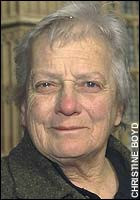
Baroness admits to 'disastrous legacy' of problem children in mainstream teaching. Liz Lightfoot reports
Baroness Warnock, the educationalist whose report led to the drive to include children with special needs in mainstream classes, admitted yesterday that the policy had failed and left "a disastrous legacy".
She is urging the Government to carry out a "radical review" of the closure of special schools, which she said were better able to provide a reassuring and personal environment for emotionally vulnerable pupils than large mainstream classes.
"Governments must come to recognise that, even if inclusion is an ideal for society in general, it may not always be an ideal for schools," she said. "I think it has gone too far. It was a sort of bright idea of the 1970s but by now it has become a kind of mantra and it really isn't working."
Pressure to include children with severe emotional and behavioural problems and those with conditions such as autism had caused confusion of which the children were the casualties, she said.
Her about-turn comes at a crucial time for many special schools where parents are fighting closure but are losing their campaigns because of legislation enacted by Labour since 1997. Ninety-one special schools have closed and the remaining 1,148 are catering for 89,540 fewer pupils despite a steep rise in the number of children diagnosed as having special educational needs.
Tories in Gloucestershire, who took control of the county council from Labour last month, are seeking ways to overturn the closure of special schools which have been approved by the Office of the Schools Adjudicator.
It decided that closures were legitimate because local authorities had a legal duty to follow the fundamental principle of the Special Educational Needs and Disability Act 2001 "which expects that the special educational needs of children will normally be met in mainstream schools".
Lady Warnock, 81, said the policy had gone too far because vulnerable children with severe problems can become isolated in mainstream schools.
Meanwhile, as special schools cater for children with the most severe and complex difficulties, they are suffering from a "patronising attitude" to what they do, she said. "They are regarded as little more than places of containment, hospitals or day centres, but with better educational facilities."
She proposes the building of more schools to serve a wide variety of needs, such as those of autistic children, which would be small enough to provide a reassuring and personal environment.
The system of statementing, where parents get a legal agreement of their children's condition and the extra support they need at a named school, has "turned out to be not a very bright idea", said Lady Warnock, who invented the system. Statementing was too bureaucratic and unresponsive to parents, she said.
Graham Barton, the spokesman for the Special Schools' Protection League, welcomed Lady Warnock's change of heart. "Inclusion has been used as a politically correct panacea by politicians but thousands of parents know they have been sold an illusion and that their children, the ones who most need help, have suffered in mainstream schools," he said.
Jayne Jardine, head teacher of Springhallow, a school for children with autism, said: "I am not against inclusion when it works but it clearly doesn't work for everybody."
from http://www.telegraph.co.uk/news/uknews/1491679/Warnock-U-turn-on-specia…
see also